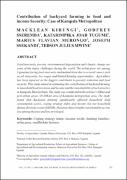| dc.contributor.author | Kirungi, Macklean | |
| dc.contributor.author | Sseremba, Godfrey | |
| dc.contributor.author | Tugume, Katarimpika Joab | |
| dc.contributor.author | Murongo, Marius Flavian | |
| dc.contributor.author | Ssekandi, Joseph | |
| dc.contributor.author | Tedson Julius Mwine | |
| dc.date.accessioned | 2021-10-29T15:12:43Z | |
| dc.date.available | 2021-10-29T15:12:43Z | |
| dc.date.issued | 2020 | |
| dc.identifier.uri | http://hdl.handle.net/20.500.12280/2858 | |
| dc.description.abstract | Food insecurity, poverty, environmental degradation and climatic change are some of the major challenges facing the world. The urban poor are among Ugandans facing food insecurity and malnutrition due to several causes such as job insecurity, low wages and limited farming opportunities. Agriculture has been reported as the biggest contributor to poverty reduction and food security. This study aimed at estimating the contribution of backyard farming to household food provision and income and the sustainability of such practice in Kampala Metropolitan. The study was conducted in the urban (<10Km) and peri-urban areas (10-20Km) area of Kampala metropolitan area. The study found that Backyard farming significantly affected household food consumption scores, coping strategy index and income but not household dietary diversity scores (HDDS). However, these benefits were found to accrue less among the poor and less privileged. | en_US |
| dc.language.iso | en | en_US |
| dc.publisher | ProQuest | en_US |
| dc.relation.ispartofseries | Journal of Social Development in Africa;Harare;Vol. 35, Iss. 1, (2020): 133-147. | |
| dc.subject | Coping strategy index | en_US |
| dc.subject | Income levels | en_US |
| dc.subject | Farming families | en_US |
| dc.subject | Urban poor | en_US |
| dc.subject | Smallholder farmers | en_US |
| dc.title | Contribution of Backyard Farming to Food and Income Security: Case of Kampala Metropolitan | en_US |
| dc.type | Article | en_US |


